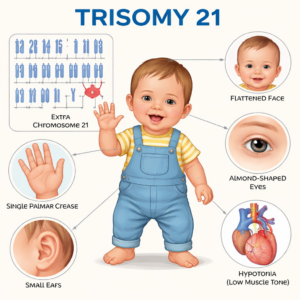What is Williams syndrome?
Williams syndrome is a genetic syndrome that presents with multiple symptoms. It is defined as a rare disease and occurs in just 1 in every 10,000 people. Symptoms of this rare disease affect multiple systems and parts of the body.
The syndrome is caused by the deletion of specific genes from a very specific region of chromosome 7. These genes may be any one of CLIP2, ELN, GTF21, GTF2IRD1 or LIMK1. The deletion of any one of these genes on chromosome 7 is believed to trigger the unique signs and symptoms of Williams. This deletion is known as microdeletion inheritance.
The syndrome is not an inherited one. It occurs due to a spontaneous gene deletion when the reproductive cells within an individual’s parents are formed. While not inherited, someone with Williams has a 50% chance of their children inheriting the condition.
Main signs
One of the main signs of Williams syndrome is its unique facial features. These include features, amongst others, such as a wide mouth, a small and upturned nose, widely spaced teeth, and full or prominent lips.
Other signs of the syndrome include medical conditions such as heart defects, specifically supravalvular aortic stenosis. Kidney abnormalities are also a symptom.
In some individuals, the first signs of this syndrome may be the presence of mild to moderate intellectual disability, or issues with learning. Very often individuals with Williams display unique personality traits and behavior unique to this genetic disorder. This can include attention deficit disorder traits, anxiety, and phobias.
Some of the earliest signs of Williams in infants include colic and issues with feeding. Infants with low birth weight and notable low muscle tone may be flagged for the syndrome also.
Physical signs of the syndrome include short stature, farsightedness, and a sunken chest.
Genetic counseling
Anyone believed to be displaying the unique signs of Williams syndrome should be referred to a genetic counselor. A genetic counselor will be able to understand an individual’s specific rare disease symptoms within the context and diagnosis of a genetic syndrome. They will also be able to understand if an individual’s potential signs of Williams syndrome are such as to warrant genetic testing for the syndrome.
A genetic counselor can explain the full process of testing for Williams syndrome and the possible results from such specific and targeted testing. They are also able to help a family understand what a diagnosis of Williams syndrome means for their child in terms of their future health and care needs.



